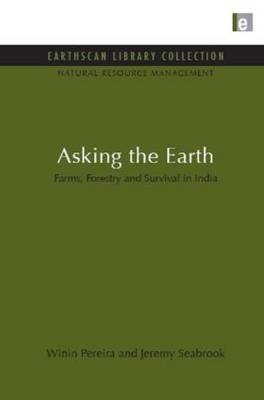
Asking the Earth
Farms, Forestry and Survival in India
Seiten
2009
Earthscan Ltd (Verlag)
978-1-84971-016-9 (ISBN)
Earthscan Ltd (Verlag)
978-1-84971-016-9 (ISBN)
The need to produce food without the destructive chemical horrors of much modern farming, for an intelligent use of dwindling natural resources and for humane forms of production is universal, the practice is limited. This book presents an account of one, large, instance of success in practice.
The need to produce food without the destructive chemical horrors of much modern farming, for an intelligent use of dwindling natural resources and for humane forms of production is universal, the practice is limited.
This book is an account of one, large, instance of success in practice. Twenty-five years ago, Winin Pereira, a nuclear physicist abandoned academia to start a co-operative farm at Alonde in a tribal area north of Bombay. The group experienced, and finally discarded, all the false hopes and promises of Western originated forms of development: ploughs that ploughed too deep, irrigation systems that lowered water tables, fertilizers and pesticides which managed the earth and became so expensive that poorer farmers were dispossessed. Instead they learnt from the adivasai, or tribal people, who have nurtured or been nurtured by foresets for millennia, ways of applying popular knowledge to contemporary problems. This book is a combination of Pereira's record of achievement of sustainable livelihoods and an account of the farm and its effect on the India around it by a leading British journalist. Originally published in 1991
The need to produce food without the destructive chemical horrors of much modern farming, for an intelligent use of dwindling natural resources and for humane forms of production is universal, the practice is limited.
This book is an account of one, large, instance of success in practice. Twenty-five years ago, Winin Pereira, a nuclear physicist abandoned academia to start a co-operative farm at Alonde in a tribal area north of Bombay. The group experienced, and finally discarded, all the false hopes and promises of Western originated forms of development: ploughs that ploughed too deep, irrigation systems that lowered water tables, fertilizers and pesticides which managed the earth and became so expensive that poorer farmers were dispossessed. Instead they learnt from the adivasai, or tribal people, who have nurtured or been nurtured by foresets for millennia, ways of applying popular knowledge to contemporary problems. This book is a combination of Pereira's record of achievement of sustainable livelihoods and an account of the farm and its effect on the India around it by a leading British journalist. Originally published in 1991
Winin Pereira, Jeremy Seabrook
Acknowledgements
Foreword
Introduction
The Other Side of History
The Sustainable Lifestyle of the Warlis
Red Ink in the 'Blueprint for Survival'
Technological Intervention
Farming Systems
Interconnections of Violence
Sa Vidya Ya Virniktaye!
The Bhagat and the Allopath
Natural Versus Formal Forestry
Celebrating Trees, Celebrating Life
Restoring our Future
Glossary of Plant Names
Index
| Erscheint lt. Verlag | 1.10.2009 |
|---|---|
| Reihe/Serie | Natural Resource Management Set |
| Verlagsort | London |
| Sprache | englisch |
| Maße | 156 x 234 mm |
| Gewicht | 544 g |
| Themenwelt | Naturwissenschaften ► Biologie ► Ökologie / Naturschutz |
| Sozialwissenschaften ► Soziologie ► Spezielle Soziologien | |
| Weitere Fachgebiete ► Land- / Forstwirtschaft / Fischerei | |
| ISBN-10 | 1-84971-016-3 / 1849710163 |
| ISBN-13 | 978-1-84971-016-9 / 9781849710169 |
| Zustand | Neuware |
| Haben Sie eine Frage zum Produkt? |
Mehr entdecken
aus dem Bereich
aus dem Bereich
Lehrbuch zu Grundlagen, Technologie und Praxis
Buch | Hardcover (2022)
Hanser (Verlag)
34,99 €


